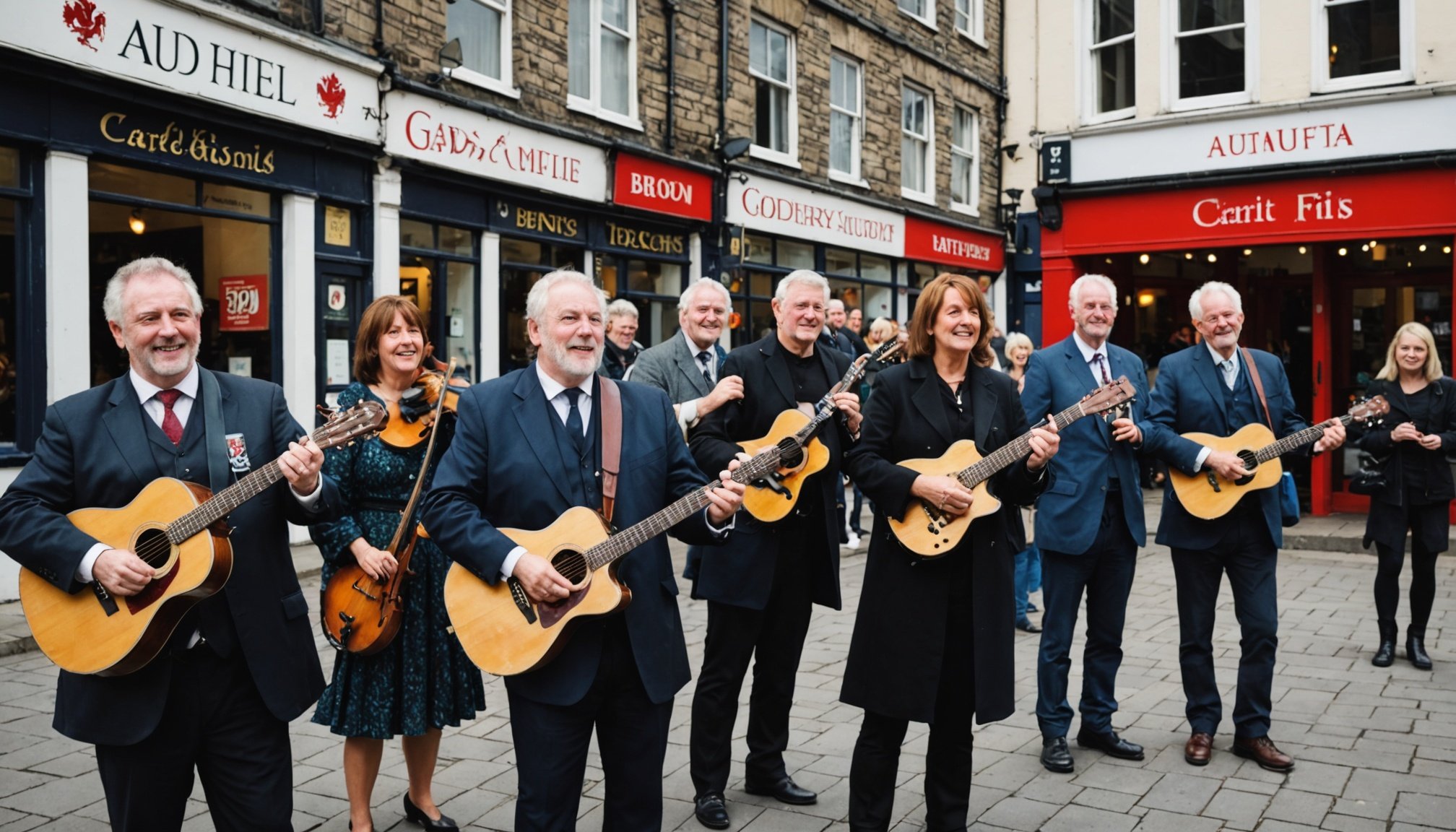Historical Overview of Traditional Welsh Music in Cardiff
The historical significance of Welsh music in Cardiff is deeply intertwined with its cultural and social fabric. This rich tradition traces back to ancient times, with origins rooted in Celtic culture, which profoundly influenced the development of Welsh musical traditions. Over centuries, traditional Welsh music has evolved through various key historical events that shaped Cardiff’s vibrant music scene.
The origins of Welsh music can be found in the songs and hymns of the early Celtic inhabitants. These melodies were often passed down orally and were integral to community gatherings and cultural rituals. As Cardiff developed, it became a hub for musical innovation and cultural exchange, playing a pivotal role in preserving these ancestral sounds.
Also read : Unleashing the Secrets to Creating a Memorable Jurassic Coast Walking Tour
Several historical events impacted the music scene in Cardiff. For instance, the industrial revolution brought an influx of people to the city, leading to a fusion of musical styles and a broadening of cultural exchanges. This period saw the emergence of music halls and public performances that celebrated Welsh traditions alongside new influences.
The presence of Celtic culture is still palpable in modern Welsh music, prominently featuring instruments like the harp and traditional compositions. This enduring legacy reflects the cultural heritage that Cardiff upholds, making it a beacon for lovers of traditional Welsh music.
Have you seen this : Discovering the Timeless Brontë Sisters: An Enchanting Expedition Through Haworth’s Literary Legacy
Significance of Traditional Welsh Music in Contemporary Cardiff
Traditional Welsh music holds a profound cultural relevance in today’s Cardiff, serving as a cornerstone of the city’s cultural identity. It provides a bridge between past and present, uniquely shaping the contemporary Cardiff music scene. Traditional tunes and songs continue to influence and inspire modern Welsh music, ensuring these age-old sounds thrive in new forms.
In Cardiff, traditional Welsh music is not just a relic of the past; it’s a vibrant part of community life. Numerous community events and venues, such as St. David’s Hall and the Tramshed, are dedicated to celebrating this musical heritage. These gatherings offer locals and visitors a chance to immerse themselves in authentic experiences of Welsh culture through music.
The influence of traditional Welsh music extends to contemporary artists, helping shape their soundscapes. Many musicians in Cardiff integrate elements of folk music into their works, thereby keeping traditional sounds alive. Artists like Gruff Rhys have famously incorporated traditional elements into their music, showcasing their respect for cultural roots.
In essence, traditional Welsh music in Cardiff is a living tradition, constantly evolving while maintaining its foundational role in the cultural landscape of the city.
Key Artists and Influencers in Traditional Welsh Music
Welsh music thrives on the legacy of famous Welsh musicians and rising local talents who have significantly shaped the Cardiff music scene. Their contributions underscore a rich cultural tapestry, integral to both historical and modern contexts in Welsh music.
Prominent Traditional Welsh Musicians
Icons like Dafydd Iwan have long embodied the spirit of traditional Welsh music, using their art to express political and cultural narratives. Their influential albums have left an indelible mark on the industry. Iwan’s songs often reflect Welsh nationalism, deeply resonating with Cardiff’s cultural identity.
Emerging Artists in the Scene
Emerging traditional music artists infuse contemporary elements while respecting traditional roots. Artists like Gwenno Saunders skillfully blend folk tones with modern pop, illustrating the evolving nature of Welsh music. Her innovative approaches create a dynamic fusion that captivates diverse audiences.
Contributions of Local Artists to Welsh Music
Cardiff musicians play a critical role in nurturing the local music scene by supporting upcoming talents and promoting Welsh heritage through music. Community-driven initiatives, such as open-mic nights and local festivals, offer valuable platforms for new voices to flourish. Through these efforts, the city’s musical heritage is continuously celebrated and preserved, ensuring its vibrancy for generations to come.
Traditional Instruments Used in Welsh Music
Traditional Welsh music is defined by its unique array of instruments, each playing an essential role in shaping the distinct soundscapes beloved in Cardiff and beyond.
Central to this tradition is the harp, particularly the triple harp, a symbol of Welsh musical identity. Revered for its ethereal tones, the harp has been instrumental in performances dating back to the 17th century. As Cardiff’s cityscape evolved, the harp remained integral, used in both intimate settings and grand festivals to evoke the rich musical heritage of the region.
Alongside the harp, other folk instruments add layers of complexity to Welsh music. The crwth, an ancient bowed string instrument, brings a haunting resonance, while the pibgorn, a woodwind made from an animal horn, offers a distinctive earthy sound. These instruments contribute to the historical significance of Welsh music, reinforcing a deep connection to Celtic traditions.
In modern Cardiff, these traditional instruments continue to feature prominently in performances, with musicians deftly blending them with contemporary styles. This fusion not only preserves historic sounds but also promotes Cardiff’s cultural heritage, ensuring the vibrancy of Welsh music for future generations.
Celebrated Festivals Showcasing Traditional Welsh Music
In Cardiff, Welsh music festivals play a pivotal role in preserving and celebrating the city’s rich musical legacy. These festivals offer immersive experiences, highlighting the cultural heritage deeply rooted in traditional Welsh sounds. They serve as a meaningful bridge between generations, showcasing the evolution of musical traditions over time.
One of Cardiff’s most notable festivals is the Welsh Proms, held annually at St. David’s Hall. This event highlights a diverse array of performances, including rich displays of traditional Welsh music, blending historical influences with modern interpretations. The festival fosters a deep appreciation of the historical significance of Welsh music, captivating audiences with its vibrant homage to the past.
Additionally, the Cardiff Summer Festival presents an eclectic mix of music, often spotlighting Welsh folk musicians. These events not only entertain but also educate attendees about the historical context and modern developments in Welsh music. They inspire a continued appreciation and exploration of traditional sounds.
Festivals in Cardiff are instrumental in revitalising cultural practices, ensuring that traditional Welsh music remains a vital part of the city’s identity. Through live performances and interactive sessions, they cultivate a respect for tradition while supporting new interpretations and innovations in the music scene.
Live Music Venues for Experiencing Welsh Music
Cardiff, a city renowned for its lively music scene, offers numerous venues to experience traditional Welsh music firsthand. These venues not only provide a stage for live performances but also play a crucial role in preserving Cardiff’s cultural heritage.
Among the must-visit places is St. David’s Hall, an iconic venue known for hosting events that spotlight traditional music. Its acoustics lend themselves beautifully to the ethereal sounds of Welsh musical instruments, making it a preferred choice for many artists.
The Tramshed, a more contemporary venue, bridges modern and traditional sounds, regularly featuring live performances of Welsh folk music. Here, audiences can immerse themselves in an eclectic mix of tunes that celebrate the cultural relevance of Welsh music.
For those seeking a more intimate experience, Clwb Ifor Bach is a beloved local gem. Known for supporting upcoming and famous Welsh musicians, this venue offers diverse line-ups that highlight traditional and modern Welsh sounds.
To make the most of the Cardiff music scene, check the venue calendars for upcoming events. Booking in advance is advised, as popular performances tend to sell out quickly. Enjoying a live session of Welsh music offers an authentic glimpse into the city’s vibrant musical tapestry.
Resources for Learning Traditional Welsh Music
Access to learning Welsh music has never been more diverse, offering rich opportunities for enthusiasts eager to explore. Various organizations and institutions across Cardiff provide structured traditional music education programs. These courses often highlight traditional Welsh instruments, techniques, and styles, catering to both beginners and advanced learners.
Online resources are a boon for self-directed learners. Websites, video tutorials, and interactive platforms discuss traditional music instruments like the harp or the crwth in detail. Such digital resources make learning accessible at home, encouraging everyone to delve into Welsh musical traditions at their own pace.
Community involvement remains a cornerstone of Welsh music education. Cardiff boasts numerous music workshops where participants can engage in practical sessions with seasoned musicians. These workshops not only teach musical skills but also foster a sense of community and shared cultural heritage.
For those keen on immersive experiences, festivals and local events often conduct workshops or demonstration sessions. This hands-on approach is invaluable in understanding folk instruments‘ nuances and historical contexts. Engaging with these resources provides an enriching pathway into the world of Welsh music, ensuring the continuation of its vibrant traditions.
Interviews with Local Musicians
Insightful musician interviews offer a unique glimpse into the personal journeys and experiences of Cardiff’s local artists, shedding light on the vibrant world of Welsh music. These dialogues not only reveal the stories behind their musical endeavours but also underscore the cultural heritage that drives them.
Discussions with prominent local musicians provide invaluable perspectives on the integration of traditional Welsh music into the modern scene. Musicians frequently elaborate on how the rich tapestry of Cardiff’s music history inspires their work, maintaining a connection with past traditions while embracing contemporary influences. This blend of old and new ensures the historical significance of Welsh music continues to thrive.
Artists often share touching anecdotes about their initial encounters with Welsh musical instruments and the mentors who inspired them. Such personal insights highlight the communal nature of music in Cardiff, encapsulating its influence on both creative expression and cultural identity.
Furthermore, local musicians are optimistic about the future of traditional Welsh music. They emphasize its ongoing evolution and relevance within the city’s dynamic cultural landscape, providing assurance that these time-honoured sounds will endure. Through these compelling narratives, readers gain a deeper understanding of the community’s dedication to preserving and propelling the tradition forward.











